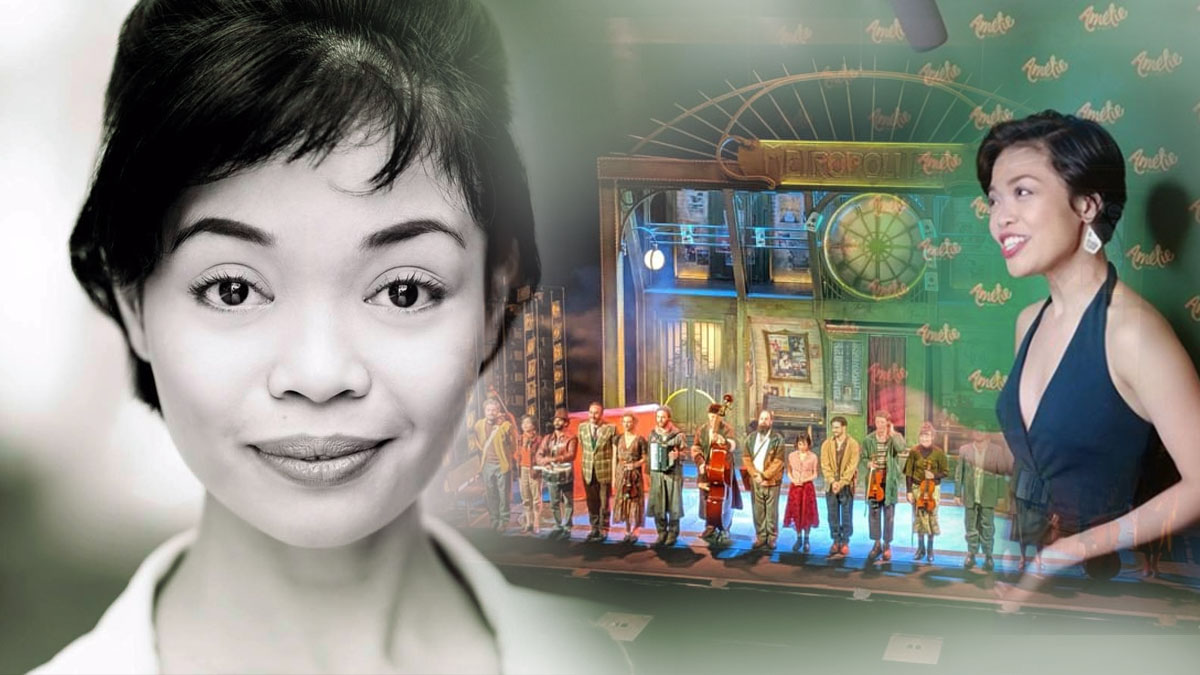
PalabasTayo is honored to have an email interview with another Pinoy pride. From being a voice major in the University of the Philippines to appearing in local stages in Manila, touring as Fish in “Cat in the Hat”, to becoming the Pinay Amélie in the UK Tour of the musical, here is Charlene “Charley” Elizabeth Magalit‘s inspiring journey.
How did you get into Amélie The Musical?
I auditioned for HK Disneyland and then ended up working in the States for Disney Cruise Line as a Main stage performer. I went back to the Philippines for a year and then worked in HK Disneyland as a vocalist, as one of the opening cast members of Mickey and the Wondrous Book. And then after 2 years, I did my MA at the Royal Central School of Speech and Drama in London, and then did “Cat in The Hat”.
I heard about Amélie from my agents. In the UK, not all shows have open auditions so this one was seen by my agents on their Spotlight Feed (an online platform in the UK that bridges producers with agents and actors for castings).
At that time I was doing my first touring show, “Cat in The Hat” as Fish. Since I wasn’t in London, I had to send self-tapes (audition videos). The director asked for a self tape of ‘Times are Hard for Dreamers’ which is Amélie’s “This Is Me” song. He also asked for a few lines of the script spoken with a French accent. After every show of ‘Cat In The Hat’, I’d work on my self-tapes, making sure that everything was perfect. I’d stay in my dressing room after hours, learning the materials and then recording them.
On the day of submissions, I was still editing the reel that I almost wasn’t able to submit it on the intended deadline. The show was about to start and I had to go on stage. Our stage managers at the time were super helpful and sent all the material to my agent’s email while I started the show. It was insane!
A day after, my agent sent me an email and said that I booked the job and they wanted me to be the cover for Amelie for the UK tour! Yay!
What was the journey to the show like? What did you need to do?
This version of Amélie is an actor-musician show, meaning aside from the usual, singing, acting, and dancing, we had to play instruments as well. The show was already complete when I and several others joined the cast. They (opening cast) were already doing shows in the original venue, the Watermill Theatre. So the process was basically trying to catch up with everyone and trying to be integrated into each number. We only had two weeks before the tour began so I had to focus on my basic ensemble track before I learned my cover tracks. My ensemble track was made very easy by our director because in the event the lead fell ill, my cover track would be on stage 95% of the time.
As we toured around the country, we (the understudies) would do extra hours in the morning before the shows to learn our cover tracks. Aside from the songs, blocking, and choreography, as Amélie’s cover I had to learn one song on the piano because in Act 2, she sings while playing the piano. I also had to learn how to fly – to use her magical lampshade with one arm, that carries her from the cafe to her room. This required a lot of extra sessions in the gym as well. Haha.
When did you do the show?
We opened the show as a full touring cast on May 20th in Wimbledon. And I learned my cover tracks for 6 weeks before we had a run in Leicester on the 2nd week of July. I was then able to play Amélie in an actual show in Glasgow, on the 21st of August.
What was it like?
It felt such an honor to be working with such talented actors and to be chosen to cover the title role regardless of race. I was the only Filipino and the only East Asian. The only other Asian cast member was Sri Lankan.
Was there any pressure? Or did you feel that you have a responsibility to represent?
There wasn’t any pressure, to be very honest. Not to sound cocky or anything but the training that I got from working with companies back home has proven to be competitive enough in an international scale. I have always been confident in my work ethic that was instilled by my mentors in the Philippines, in the Disney company, and here in London. So there was a comfort in knowing that I knew the business well enough already and that what I was doing and how I was doing it is enough. They love us (Filipinos) here because we work hard, we have no qualms, and we’re so damn nice to everyone.
Lol.. syempre meron. Mostly family. I used to want to make my country proud pero if I’m being brutally honest, I stopped because I didn’t want to disappoint myself if my achievements didn’t actually make anyone apart from my family, proud.
I think my goal, in the end, was to not make the Filipino people proud of me but for the UK people to see how great Filipinos are and for them to realise that the world is diverse and that Amélie can be played by an Asian girl and sometimes, race doesn’t matter. I think we’re just so triggered by race and appropriation nowadays.
Can you tell us about your routine on show days?
My routine changes depending on how or what my body feels for the day. But I always start with a good cup of coffee between 8.30-9 am. I do some form of exercise—I mix it up between doing yoga, running, Insanity (with my cast) or swimming (if facilities are available), I then make my food for the day and then do something creative—I sing if I need to work on an audition, I draw if I’m in the mood, play the piano or dance (Learning tap routines with castmates).
I would then start warm-up, make-up with the company at 6.15 for a 7.30 pm show. And then I would be out of my costume at around 10 and be home at 10.30pm and be in bed midnight (with the occasional exception of a night out with the team.)
How different is performing on a show tour vs a regular show? Vs performing in Manila?
Touring vs Regular show: Touring is a lot more difficult than doing a regular show but a lot more rewarding: 1) You’re moving from venue to venue which means that it’s an adjustment to the new theatre every week. 2) The show will be exposed to different audiences who will have different reactions and will respond to different things so the challenge is to stay truthful to the material and not play for a reaction from the audience. 3) Traveling is tiring- I’ve lived out of my suitcase for the past year having had to do back to back tours. It can get tiring if you do it non-stop but it has its own rewards— you get to travel for free, and it’s the best way to see the country. 4) You get seen by more people (directors and reviewers) for tours but sometimes, it’s better to be seen by the people in the center (London) because most people who cast are there so this is when doing a stationary show in town is ideal. 5) When you’re doing a stationary show, it’s easier to invite friends and prospect employers to see you whereas if you’re on tour, it’s more difficult.
Performing in the UK vs Performing in Manila: Performing in the UK is so different from performing in Manila because here, more often than not, everyone is treated equally. Back home there’s this imagined hierarchy where the director and producers are above everyone else and it’s normal for the production team to receive so much shit from said people but it’s not the case in the UK. It’s completely normal to call everyone with their first name and to meet at a pub and get a pint after work. Everyone respects everyone else’s work. It’s acknowledged that every person has a crucial part to play.
There’s also an entity that regulates how everyone is treated, how breaks are given, and how much you’re paid which makes everything easier because you know what to expect and you’ll know when a person is out of line. In Manila, at least from my personal experience and from what I remember, a lot of these rules get blurred and do not have a standard that everyone follows.
In Manila, it’s difficult to sell shows as well because we concentrate everything in the center and everything is so expensive for the common person. We don’t have enough shows for kids or disabled or deaf/ blind people. Here, theatre is introduced to children as young as 3 months old (yes, some shows of “Cat in the Hat” had special performances for babies where they’re allowed to leave whenever and audio and lighting effects are reduced so that kids won’t be too scared) and everything is made to be inclusive to disabled members of the community. Here, they’ve achieved the saying that “Theatre is for all”.
What are foreign audiences like? Are they perfectionists like Filipinos?
Foreign audiences are very respectful and very professional. More often than not, they know proper theatre etiquette. It has been embedded in their culture for centuries, after all. They are very open to seeing/giving a chance to new work.
I think it’s quite hasty to generalise that ALL Filipinos are perfectionists or that theatre-goers here are perfectionists as well. I just know that UK audiences are aware of what the standards a good show should have, and it’s not about flashy lights and big, sometimes misplaced, acting. There are a lot of different venues for shows here and there are ones that are called a “fringe” venue— it means that it’s Off-West End, it’s not an actual theatre (sometimes the upstairs venue of a pub), and it has a lower budget compared to the big shows in town. I think what the UK audiences are after, more than anything, are good stories and good storytelling.
What are your learnings in your 5-month stint as cover of AMÉLIE?
I’ve never been an understudy before so being an effective understudy was my biggest achievement and takeaway from this experience. Learning, first and foremost, your role in the company and being patient while waiting for everything you’ve learned to come into fruition was so important. Being ready whenever, wherever was also one of my greatest achievements. I knew that I could go on anytime our leading lady was unwell and that brought a sense of pride to me. This saying has also been a recurring theme in my life— it’s never too late to learn something new, and we can never stop improving on ourselves and our craft.
What are you up to now? What are your plans?
I am currently auditioning for films and commercials. I am also in the process of applying for my Exceptional Talent Visa which will allow me to stay in the UK and then apply for settlement later on. I am planning to write my own show and produce it in a fringe festival next year. Then maybe, develop an MT workshop for my alma mater, the University of the Philippines College of Music later next year.
Click here for more stories like “Pinay Amélie in the UK tour of the Musical”. Make sure to follow and subscribe to our social media accounts: Facebook, YouTube, Instagram, and Twitter.






















